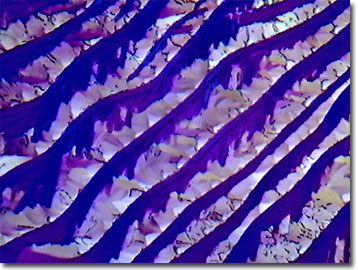Polarized Light Digital Image Gallery
2',3'-Dideoxycytidine (ddC)
2',3'-dideoxycytidine (ddC) is a prescribed pharmaceutical used in the treatment of AIDS, often in combination with AZT (3'-azidothymidine) or other drugs. Although this drug therapy does not cure the deadly malady, dideoxycytidine and its relatives help slow down the destruction of the patient's immune system by the HIV virus.

View a second image of dideoxycytidine.
Marketed in the United States and Canada under the trade names Hivid or ddC, or the drug name zalcitabine, the antiretroviral medicine is a nucleoside reverse transcriptase inhibitor. Reverse transcriptase inhibitors are medicines that block human immunodeficiency virus (HIV) reverse transcriptase during the early stage of viral replication by attaching to the enzyme. Thus, production of new HIV virus is prevented by interfering with DNA replication in viral cells, lowering the amount of virus in the body. The known side effects include nausea, abdominal pain, tingling in hands and feet, burning, numbness, and joint pain, among others.
Although ddC helps control the virus population of a patient, it does not make them non-infectious. This drug and related formulations are not fit for people with impaired kidneys or liver disease, since these organs actively work to remove the medication from the body. Structurally and chemically, zalcitabine is a cytidine nucleoside analogue. Cytidine is one of the four nucleosides that make up RNA and DNA sequences, and is classified as a pyrimidine base along with thymidine. With 9 carbons, 13 hydrogens, 3 nitrogens and 3 oxygens, the melting point of the white crystalline powder is about 210 degrees Celsius. Many of the side effects of drug therapy with 2',3'-dideoxycytidine result from mitochondrial toxicity and peripheral neuropathy of its metabolites. Indications are that unintended mitochondrial uptake can be inhibited with the addition of L-carnitine, and thus prevent the depletion of mitochondrial DNA in non-virus cells in the body.
Contributing Authors
Omar Alvarado, Thomas J. Fellers and Michael W. Davidson - National High Magnetic Field Laboratory, 1800 East Paul Dirac Dr., The Florida State University, Tallahassee, Florida, 32310.
BACK TO THE POLARIZED LIGHT IMAGE GALLERY
BACK TO THE DIGITAL IMAGE GALLERIES
Questions or comments? Send us an email.
© 1995-2025 by Michael W. Davidson and The Florida State University. All Rights Reserved. No images, graphics, software, scripts, or applets may be reproduced or used in any manner without permission from the copyright holders. Use of this website means you agree to all of the Legal Terms and Conditions set forth by the owners.
This website is maintained by our
Graphics & Web Programming Team
in collaboration with Optical Microscopy at the
National High Magnetic Field Laboratory.
Last Modification Friday, Nov 13, 2015 at 01:19 PM
Access Count Since September 17, 2002: 8519
Visit the website of our partner in introductory microscopy education:
|
|
